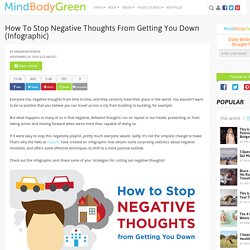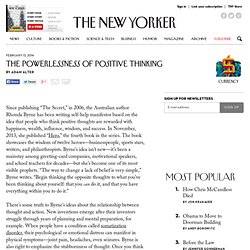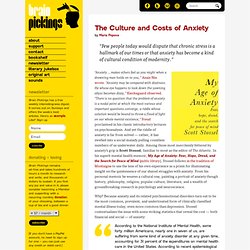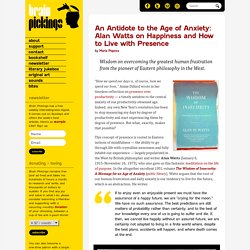

How To Stop Negative Thoughts From Getting You Down (Infographic) By MindBodyGreen November 20, 2014 5:23 AM EST Everyone has negative thoughts from time to time, and they certainly have their place in the world.

7 Simple Steps To Lower Your Stress (No Meditation Or Exercise Required) 7 Tips To Manage Anxiety Sometimes, we know what's making us anxious and can negotiate calm.

Other times, our anxiety is caused by hormones or too much caffeine or something more out of our control, and we just have to ride Read What's the best way for me to piss off a stressed-out client? Tell them to manage his stress by getting more sleep. Or eating better. Everyone wants to know how they can reduce the stress in their lives, but so many of the "solutions" increase responsibilities and thus increase stress. Use Louis CK's 70% Rule to Avoid Decision Paralysis. The Powerlessness of Positive Thinking. Since publishing “The Secret,” in 2006, the Australian author Rhonda Byrne has been writing self-help manifestos based on the idea that people who think positive thoughts are rewarded with happiness, wealth, influence, wisdom, and success.

In November, 2013, she published “Hero,” the fourth book in the series. The book showcases the wisdom of twelve heroes—businesspeople, sports stars, writers, and philanthropists. Byrne’s idea isn’t new—it’s been a mainstay among greeting-card companies, motivational speakers, and school teachers for decades—but she’s become one of its most visible prophets.
“The way to change a lack of belief is very simple,” Byrne writes. “Begin thinking the opposite thoughts to what you’ve been thinking about yourself: that you can do it, and that you have everything within you to do it.” There’s some truth to Byrne’s ideas about the relationship between thought and action. The books have many adherents; most of their Amazon reviewers give them five stars. How to Stop Your Negative Thoughts From Spiraling Out of Control. What do you do when a negative thought or series of thoughts come into your mind?

How can you stop the scenario from unfolding? It is amazing how our minds start going down a negative path, picking up momentum. Then, all of a sudden, we are totally depressed, fearful, or anxious. You convince yourself this negative event is going to happen. For instance, imagine that you are driving to work for a very important meeting. A simple story in Joel and Michelle Levey’s book, Living in Balance, caught my eye. The Culture and Costs of Anxiety. By Maria Popova “Few people today would dispute that chronic stress is a hallmark of our times or that anxiety has become a kind of cultural condition of modernity.”

“Anxiety … makes others feel as you might when a drowning man holds on to you,” Anaïs Nin wrote. “Anxiety may be compared with dizziness. He whose eye happens to look down the yawning abyss becomes dizzy,” Kierkegaard observed. “There is no question that the problem of anxiety is a nodal point at which the most various and important questions converge, a riddle whose solution would be bound to throw a flood of light on our whole mental existence,” Freud proclaimed in his classic introductory lectures on psychoanalysis. Simon Sinek: Why good leaders make you feel safe.
A Simple Exercise to Increase Well-Being and Lower Depression from Martin Seligman, Founding Father of Positive Psychology. By Maria Popova You’ll need pen, paper, and a silencer for cynicism.

“When [a man] has fair health, a fair fortune, a tidy conscience and a complete exemption from embarrassing relatives,” Henry James wrote in his diary, “I suppose he is bound, in delicacy, to write himself happy.” More than a mere philosophical contemplation, however, James’s observation presages the findings of modern psychology in the quest to reverse-engineer the art-science of happiness. No one has addressed the eternal question of what begets happiness with more rigor and empirical dedication than Dr. The Intelligence of Anxiety. ~ Ian Andersen. Three Tricks for Dealing with Anxiety In the Moment. 7 ways stress does your mind and body good. Anxiety: The Underlying Cause Everyone Should Know About. ~ Bella Dodds. This Is Your Body On Anxiety (Infographic) 10 Signs You Have WAY Too Much Cortisol. We all know stress is bad for us, yet many of us wear it like a badge of honor.

We claim to want inner peace, but if life gets too calm, we go seeking our next hit of cortisol and epinephrine. It’s almost as if being stressed makes us feel important, valuable, and useful. But the biggest problem with being a stress addict is that it can destroy our health. As I explain in my new book, Mind Over Medicine: Scientific Proof That You Can Heal Yourself, the body is equipped with natural self-repair mechanisms that can kill stray cancer cells, fight infections, and even slow the aging process.
But these mechanisms only work when the nervous system is relaxed. So how do you know if you’re a stress addict? You experience backaches and headaches. Ask Yourself the Right Questions to Get Over a Fear of Failure. The Science of Our Warped Perception of Time, Animated. Kelly McGonigal: How to make stress your friend. 6 Steps To Set Good Boundaries. In the past two months, I have learned more about the importance of boundaries than I have in my entire adult life.

I used to keep adjusting my boundaries to fit each relationship. Now I understand that boundaries are about your relationship with yourself and your own values, and that they shouldn't be so fluid. Today, I want to share what I have learned and break it down for you in five incredibly simple steps. I have gained so much understanding about this topic from the book Boundaries by Dr.
Cloud & Dr. The Culture and Costs of Anxiety. An Antidote to the Age of Anxiety: Alan Watts on Happiness and How to Live with Presence. By Maria Popova Wisdom on overcoming the greatest human frustration from the pioneer of Eastern philosophy in the West.

Kierkegaard on Anxiety & Creativity. The Biggest Lessons I've Learned from Managing Anxiety. The Intelligence of Anxiety. ~ Ian Andersen. Happy Birthday, Aung San Suu Kyi: The Beloved Peace Icon on Freedom from Fear.